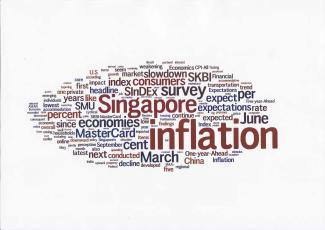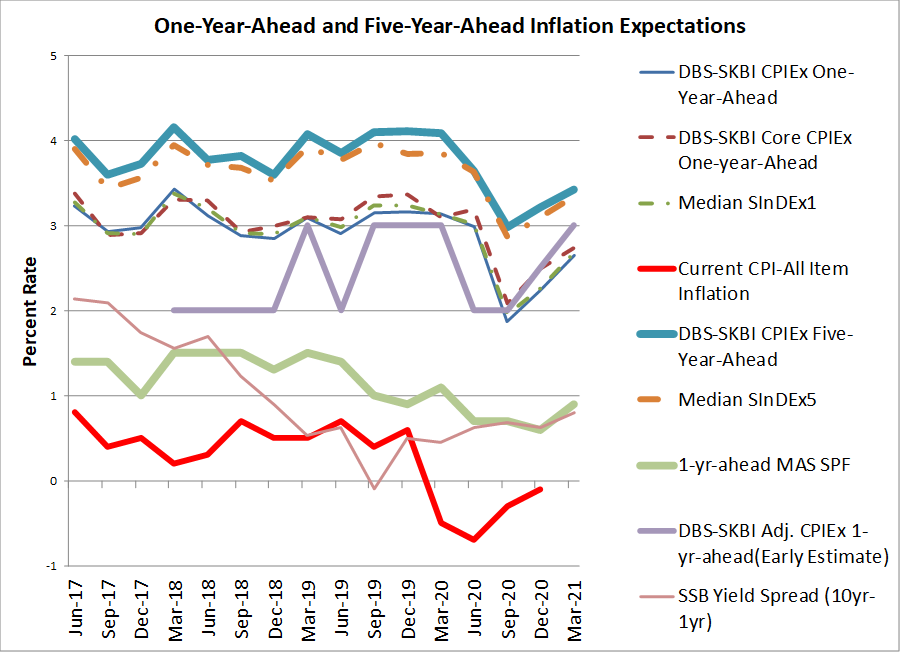
These are the research findings of the 39th round of quarterly release for the DBS-SKBI Singapore Index of Inflation Expectations (SInDEx) Survey at the Sim Kee Boon Institute for Financial Economics (SKBI), Singapore Management University (SMU).
- One-year-ahead headline inflation expectations continue to recover, rising to 2.7% in March 2021, from 2.2% in December 2020. Headline inflation expectation has been on an upward trend since September 2020, although it remains modest, with a lower reading than the historical (2012-2020) first quarter average of 3.3%.
- Three months since the beginning of Phase 3 reopening, some semblance of normalisation and global cues of recovery with the massive rollout of various vaccines might have continued to buoy inflation expectations together with positive sentiments about global recovery. As a comparison benchmark, the MAS Survey of Professional Forecasters (MAS SPF) data released in March 2021 showed that the median forecasts of CPI All-Items inflation for 2021 was 0.9%, up from their estimate of 0.6% in December 2021. The latest Department of Statistics’ CPI All-Items inflation reading in February 2021 was 0.7%.
- The overall CPIEx Inflation Expectations, after adjusting for potential behavioural biases and re-combining across components, edged down to 3.1% in March 2021 from 3.2% in December 2020. Inflation expectations for majority of the components like food, transport, healthcare, education, recreation and culture, clothing & footwear, household durables & services and communication have remained unchanged, while that for housing & utilities have come down marginally. In comparison, miscellaneous goods and services like personal care and personal effects have gone up slightly. We also observed that the free-response unadjusted overall inflation expectations increased to 3.0% in March 2021 compared to 2.5% recorded in the December 2020 survey, suggesting an uptick in overall inflation expectations that is revealed in the March 2021 survey. The slight correction of recombined index is generally against a more discernable upward trend of aggregate inflation expectations measures.
- In the March 2021 wave, continuing the analysis we embarked on since September 2020, an in-depth survey on the potential impact of Covid-19 on inflation expectations of different components of CPI was conducted. Similar to the December wave, we found that the inflation expectations for most components were not significantly influenced by Covid-19, except for healthcare inflation which depicted a slight uptick.
- Following the academic work by Alberto Cavallo of Harvard Business School (2020) and the UK Office of National Statistics (ONS), respondents were asked if there were any substantive changes to their consumption basket. In September 2020, we observed moderate declines in households’ spending on clothing & footwear, transport and recreation & culture. However, households’ consumption patterns appear to continue at pre-COVID norms in March 2021, similar to the findings in December 2020, as consumer spending picks up and economic activities resume. So it seems the consumption basket change was a transient phenomenon which has since dissipated.
- Excluding accommodation and private road transportation related costs, the One-year-Ahead CPIEx core inflation expectations edged up to 2.7% in March 2021 (from 2.5% in December 2020). This increase possibly reflect renewed economic activities, as well as the recovery of global inflation alongside an upswing in world commodity prices such as oil.
- For a subgroup of the population who owns their accommodation and uses public transport, the One-year-Ahead CPIEx core inflation expectations also increased to 2.6% in March 2021 from 2.1% in December 2020. Not being exposed to expenses related to private road transportation or housing rentals, this subgroup’s expectations of core inflation closely resemble the Singapore Core Inflation Expectations.
- The One-year-Ahead composite index SInDEx1 that puts less weight on more volatile components like accommodation, private transport, food and energy, polled at 2.7% in March 2021 compared to 2.3% polled in December 2020. This remained below the first quarter average of 3.4% since the survey’s inception in 2012 till 2020.
- In March 2021, around 67% of the survey respondents reported their belief that Covid-19’s impact on inflation would be significant compared to 71% in December 2020. The share of survey respondents who feel that Covid-19 will have long-term impact on inflation also declined to around 67%, from nearly 72% in December 2020. Both the results indicate that, with incremental rollout of vaccination worldwide, more respondents feel that the end of the pandemic is in sight.
- In addition, around 13.4% of the Singaporeans polled expect a more than 5% reduction in salary in the next 12 months, this is a lower proportion compared to 18.1% in December 2020. The median salary increment expectations stayed between -1% and 1%.
- As a measure of the tradeoff between prioritising economic growth compared to the cost to life, the so-called livelihood over life debate, the ratio was 2.3 in March 2021, lower than 3.1 in December 2020. This means for every person who prioritise life over livelihood, there are two who prioritised livelihood over life. As the work life is getting more normalised, and the economy is slowly but steadily opening up, this choice of life over livelihood is probably becoming less of an issue.
Figure 1: One-year-Ahead-inflation expectations: The chart shows the quarterly DBS-SKBI CPIEx (CPI-All Item) and DBS-SKBI CPIEx Core (Excluding accommodation and private road transportation components) One-Year-Ahead Inflation Expectations polled in the quarterly online Singapore Index of Inflation Expectations (SInDex) Survey conducted March 15-23, 2021.

DBS Chief Economist and Managing Director of Group Research, Dr. Taimur Baig commented, “Singapore’s economic recovery continued through the first quarter, along with a pronounced upward trend in a wide range of prices in the global market for commodities and manufactured goods. Unsurprisingly, these developments have been accompanied by a revival in inflation expectations, although they remain well anchored. We expect to see strong growth outturns worldwide in the second half of the year as pandemic management turns a corner, which should also be marked by further but modest increases in inflation expectations.”
SMU Assistant Professor of Finance and founding Principal Investigator of the DBS-SKBI SInDEx Project, Aurobindo Ghosh observed, “In their World Economic Outlook release in April 2021, IMF economists have increased their growth forecasts to 6% for 2021. This is attributed mainly to the phenomenal rollout of the Covid-19 vaccines and strong expected recovery on the back of unprecedented fiscal stimulus globally in preparation for a post- pandemic world. A cyclical rise in commodity prices including oil price, the pace of recovery, along with record low interest rates globally have triggered a debate on increased inflation risk among practitioners, academics and policymakers. In the survey conducted in March 2021, we find an uptick in inflation expectations across the board even though the signal is less clear among the components of inflation as consumption basket patterns seem to have reverted to pre-pandemic levels. Consumer sentiments seem to have been buoyed by the record- breaking financial markets rather than the more uncertain and divergent growth in jobs and trade.”
For the longer horizon, the Five-year-Ahead CPIEx inflation expectations in the March 2021 survey edged up to 3.4% from 3.2% in December 2020. The current polled number is significantly lower than the first quarter average of 4.2% since the survey’s inception in 2012 till 2020.
The Five-year-Ahead CPIEx core inflation expectations (excluding accommodation and private road transportation related costs) also increased to 3.3% in March 2021 compared to 3.1% in December 2020. Overall, the composite Five-year-Ahead SInDEx5 also increased to 3.3% in March 2021 from 3.1% in December 2020. In comparison, the first quarter average value of the composite Five-year-Ahead SInDEx5 was 4 % since the survey’s inception in 2012 till 2019.
“While it is often accepted that investment activity based measures of inflation expectations are the “gold standard,” it is based on informed economic agents including institutional hedge funds who are actively trading in the bond market including in Treasury Inflation Projected Securities (TIPS). In the absence of such measures, our best guess is to survey individuals who are making consumption and investment decisions, as those are the economic agents who matter the most as it affects their pocketbook. However, perceptions of uncertainty and behavioural biases might also lead to overly pessimistic projection of long-term inflation expectations that might subsequently lead to un-hinged inflation expectations. In its 10th year of existence, DBS-SKBI SInDEx survey finds Singaporean’s long-term or five=year-ahead inflation expectations indicate change of directions and longer term trends better than the level of inflation itself. Furthermore, long term inflation expectations seem to be well anchored as it does not seem to deviate too much due to the short term turmoil mainly attributable to the impact of the Covid 19 pandemic” Professor Ghosh observed.
Figure 2: Five-year-Ahead-Inflation Expectations in Singapore: The chart shows the quarterly DBS-SKBI CPIEx (CPI-All Item), DBS-SKBI CPIEx Core (Excluding accommodation and private road transportation components), SInDEx (Composite index with lower weights on volatile components like food, energy, accommodation and private road transportation) One-Year and Five-Year-Ahead Inflation Expectations polled online quarterly for the Singapore Index of Inflation Expectations (SInDex) Survey conducted March 15-23, 2021. The chart shows a preliminary estimate of Behaviourally Adjusted One-year-Ahead overall DBS-SKBI Adjusted CPIEx. As comparison benchmarks, the chart provides the most recent quarterly CPI-All Item Inflation, MAS Survey of Professional Forecasters median One-year-Ahead CPI-All Item inflation forecasts and the yield spread of 10-year and 1-year Singapore Savings Bonds (SSB).

Methodology
DBS-SKBI SInDEx survey yields CPIEx Inflation Expectations (estimating headline inflation expectations) and related indices are products of the online survey of around 500 randomly selected individuals representing a cross section of Singaporean households. The survey is led by Principal Investigator Dr. Aurobindo Ghosh, Assistant Professor of Finance (Education) at Lee Kong Chian School of Business, SMU. The online survey collection powered by Agility Research and Strategy helps researchers understand the behavior and sentiments of decision makers in Singaporean households. DBS Group Research is a co-sponsor and research partner with the Sim Kee Boon Institute for Financial Economics (SKBI) at SMU.
The quarterly DBS-SKBI SInDEx survey has also yielded two composite indices, SInDEx1 and SInDEx5. SInDEx1 and SInDEx5 measure the 1-year inflation expectations and the 5-year inflation expectations, respectively. The sampling was done using a quota sample over gender, age and residency status to ensure representativeness of the sample. Employees in some sectors like journalism and marketing were excluded as that might have an effect on their responses to questions on consumption behavior and expectations.
The DBS-SKBI SInDEx survey was augmented in June 2018, based on a joint research study conducted by SMU researchers in collaboration with MAS and the Behavioral Insights Team, where respondents were polled about their perceptions of components of the Consumers Price Index (CPI) and adjusted for possible behavioral biases prevalent in online surveys.
Based on the recommendations of the joint study, since March 2019 the research team polled the One-year-Ahead inflation expectations of all of the major components of CPI-All Items inflation. The component-wise inflation expectations have largely stayed the same except for a slight drop in housing & utilities and an uptick in prices of miscellaneous goods & services. In free response answers, compared to December 2020 survey, respondents in the March 2021 survey polled One-year Ahead and Five-year Ahead headline and core inflation expectations to go up.
We introduced a new ratio in June 2020 survey, on the life versus livelihood debate as an aftermath of the Covid 19 pandemic - the ratio of respondents who feels livelihood should be prioritised over life over those who feel the other way round. This ratio declined from 3 in December 2020 to 2 in March 2021, which means for every respondent who prioritise life over livelihood, there were 2 who prioritised livelihood over life, down from 3 in June 2020.